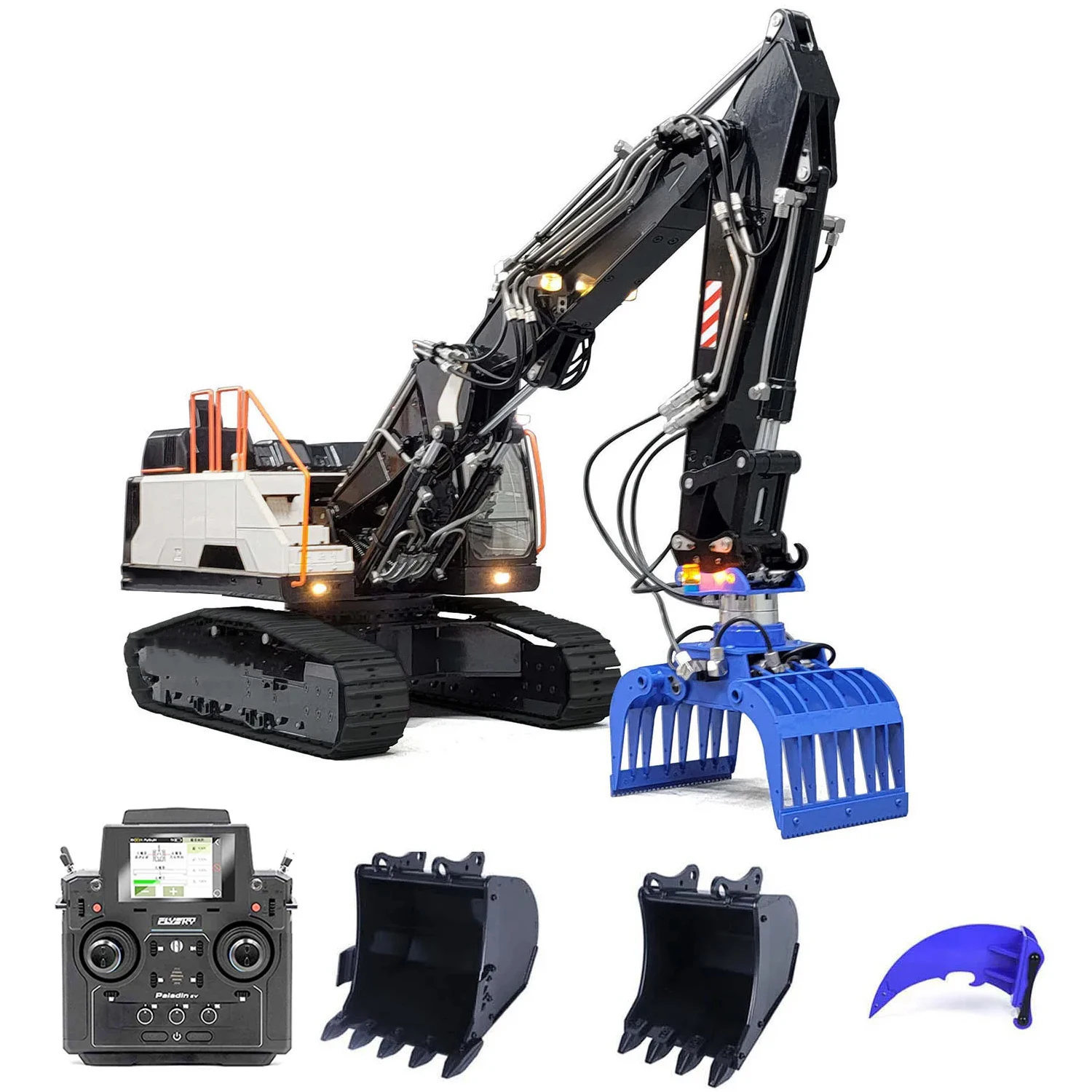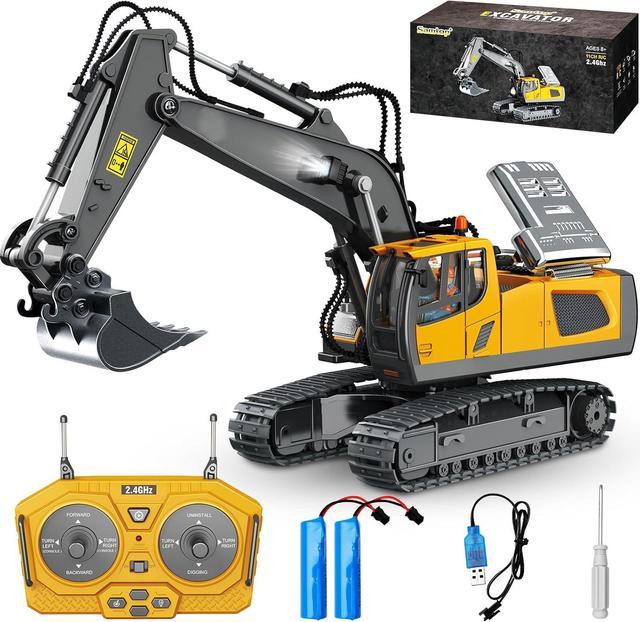How a rc excavator Helps You Tackle Challenging Terrain with Ease
Wiki Article
Comprehending How Excavator Works and Its Influence on Effectiveness
Excavators play an important duty in building and mining procedures, depending on a complicated interplay of hydraulic and mechanical systems. Their capacity to carry out a range of jobs rests on both their style and the modern technology integrated within. Comprehending these parts can substantially influence functional efficiency and productivity. As improvements proceed to improve the industry, one need to think about how these modifications will influence future techniques and efficiency.The Essentials of Excavator Mechanics

The Function of Hydraulic Systems in Excavators
At the heart of excavator operation lies the hydraulic system, which plays a crucial duty in powering the device's activities and functions. This system utilizes pressurized hydraulic fluid to transfer power, making it possible for different actions such as excavating, lifting, and moving. By harnessing the concepts of hydraulics, excavators can perform jobs with impressive accuracy and force, enhancing overall functional efficiency.The hydraulic system contains vital components, consisting of pumps, valves, and cyndrical tubes, which collaborate to control the circulation and instructions of the liquid. When the operator involves the controls, the hydraulic liquid is guided to certain cylinders, converting the operator's commands into physical movement. This system permits for responsive and smooth activities, which are crucial in building and excavation settings. double e volvo rc excavator. The effectiveness of the hydraulic system directly impacts the efficiency and adaptability of the excavator, making it a vital element in modern excavation proceduresKey Components of an Excavator
Recognizing the vital parts of an excavator is important for realizing how this effective equipment runs. An excavator includes several considerable elements, including the undercarriage, home, arm, bucket, and boom. The undercarriage gives stability and mobility, commonly featuring tracks or wheels to navigate various terrains. The house contains the engine and hydraulic systems, allowing the operator to manage motion and power the machine. The boom prolongs from the house, allowing upright reach, while the arm connects to the bucket, facilitating digging and lifting operations.Additionally, the cab houses the driver, furnished with controls for precise maneuvering. Each of these components plays an important function in the excavator's total functionality, contributing to its efficiency and effectiveness on building and construction sites. Understanding these parts assists in keeping and maximizing excavator performance, guaranteeing tasks are finished securely and effectively.Attachment Adaptability and Its Benefits
Attachment flexibility is an essential facet of excavators, allowing drivers to switch between numerous devices customized for details jobs. This adaptability not only enhances job effectiveness however additionally contributes to cost-effectiveness by decreasing the requirement for several machines. Understanding the various kinds of attachments readily available can considerably influence the total efficiency and capability of an excavator on work websites.Kinds of Add-ons
While excavators are largely identified for their digging capacities, their true adaptability depends on the vast selection of add-ons offered. These attachments improve the excavator's performance, permitting it to execute numerous jobs beyond excavation. Common add-ons include buckets (for excavating and scooping), hydraulic thumbs (for comprehending products), and augers (for drilling holes) Grapples are used for managing and moving debris, while rippers can separate tough surfaces. Other specialized attachments, such as plates and plows, enable excavators to adjust to details job needs. This diversity not just enhances the machine's utility across various industries, including demolition, building and construction, and landscape design, yet likewise enables drivers to customize their devices to fulfill certain job demands efficiently.Boosted Work Efficiency
Maximizing work performance is a main benefit of making use of different excavator accessories. Various accessories permit an excavator to execute multiple jobs without requiring to change devices, conserving beneficial time and labor. Making use of a hydraulic hammer can damage concrete while a bucket add-on can dig deep into soil, allowing a smooth process. This adaptability lowers downtime connected with equipment modifications and enhances productivity on-site. Furthermore, specialized add-ons boost accuracy in tasks such as grading or landscaping, resulting in better end results. The ability to adapt to different job requirements not just improves operations but additionally lessens the need for extra equipment, making sure that projects are completed swiftly and properly. In general, attachment flexibility significantly contributes to increased task performance in excavation work.Cost-Effectiveness and Flexibility
Cost-effectiveness is a significant advantage of utilizing flexible excavator accessories. These add-ons enable a single excavator to carry out several tasks, minimizing the requirement for added machinery and labor - double e volvo rc excavator. By changing between buckets, hammers, and grapples, drivers can take on numerous jobs, from digging to demolition, thereby maximizing tools use. This adaptability not only decreases operational prices but additionally minimizes downtime connected with altering equipment. In addition, the ability to tailor excavators with specialized accessories improves performance, as they can successfully take care of diverse jobs according to task needs. In conclusion, the combination of cost-effectiveness and adaptability in excavator add-ons contributes to enhanced functional performance and resource appropriation in construction and excavation jobs
Advanced Innovation in Modern Excavators
Modern excavators are progressively equipped with innovative modern technology that transforms excavation procedures. Automation enhances operations, while improved fuel performance minimizes functional remote control excavator prices. In addition, wise control systems enhance precision and safety and security, noting a significant evolution in excavation equipment.Automation in Excavation Processes
As excavation innovation progresses, automation has actually become an essential element in improving efficiency and accuracy on job websites. Modern excavators are geared up with innovative automated systems that assist in jobs such as grading, digging, and trenching with marginal driver treatment. These systems use sensing units, GPS, and equipment knowing algorithms to guarantee exact positioning and depth control, significantly lowering the margin for mistake. In addition, automation allows drivers to concentrate on tactical decision-making as opposed to hands-on controls, leading to enhanced performance overall. Such developments not only enhance operations but likewise improve security by reducing human error in intricate operations. Subsequently, the combination of automation in excavation procedures represents a considerable innovation in building and construction innovation, driving the sector towards greater efficiency and performance.Improved Fuel Efficiency
Innovations in technology have actually additionally resulted in considerable enhancements in gas performance for modern excavators. Modern makers are furnished with sophisticated engines that maximize power result while decreasing fuel consumption. These engines utilize innovative combustion innovations, such as turbocharging and direct fuel injection, to improve efficiency and performance. In addition, light-weight materials in building decrease general weight, permitting less energy expense during operation. The intro of variable rate controls enables drivers to change engine performance according to particular jobs, better reducing gas use. Because of this, these enhancements not just reduced functional prices however additionally add to environmental sustainability by decreasing discharges. On the whole, enhanced gas effectiveness in excavators is a necessary advancement that reinforces see this performance and financial practicality in the building and construction market.Smart Control Systems
While drivers navigate increasingly complex task sites, smart control systems in excavators have actually arised as crucial devices for improving effectiveness and accuracy. These sophisticated modern technologies make use of formulas and sensors to monitor various criteria such as lots weight, terrain conditions, and functional efficiency. By instantly readjusting hydraulic features, smart systems optimize equipment efficiency, leading to boosted productivity and decreased wear on elements. Furthermore, operators gain from instinctive interfaces that give real-time comments and diagnostics, enabling informed decision-making. This combination of innovation not just improves procedures however also reduces human mistake, adding to much safer workplace. As the building market remains to progress, smart control systems will play a vital duty in shaping the future of excavator efficiency and performance.Enhancing Operational Performance With Excavators
Excavators play a necessary function in enhancing functional performance across various building and construction and excavation projects. Their convenience allows for several tasks, consisting of training, material, and excavating handling, which improves operations and lowers the need for extra tools. With effective hydraulic systems, excavators can perform heavy-duty jobs with accuracy, significantly decreasing the moment needed to total jobs. The combination of sophisticated innovation, such as general practitioner and automated controls, better enhances their operation, enabling operators to accomplish greater view website accuracy and reduce material waste. In addition, contemporary excavators are designed to take in much less fuel and minimize exhausts, adding to both cost financial savings and environmental sustainability. By utilizing excavators effectively, building and construction teams can improve productivity, meet project due dates, and improve overall website monitoring. This multifunctionality and efficiency make excavators vital tools in the modern-day building and construction landscape.The Future of Excavators in Building And Construction and Mining Industries
As the building and construction and mining industries advance, the future of excavators is poised for substantial change driven by technological development and transforming functional demands. Developments in automation and artificial intelligence are reshaping excavator capacities, permitting enhanced precision and efficiency in procedures. Autonomous excavators are emerging, reducing the need for human treatment and reducing the danger of accidents.Moreover, the assimilation of telematics and IoT modern technology enables real-time tracking of device performance and anticipating maintenance, optimizing uptime. Environment-friendly layouts, including hybrid and electrical models, are getting traction, lining up with sustainability objectives within the industry.Additionally, making use of innovative products and lighter styles enhances gas efficiency while preserving performance requirements. As these fads development, excavators will play a vital role in fulfilling the increasing needs for productivity and security in building and construction and mining, ultimately changing operational landscapes.Regularly Asked Concerns
How Do Weather Affect Excavator Efficiency?

Weather significantly affect excavator efficiency, as rain and mud can prevent traction and security, while extreme temperature levels might affect hydraulic systems. Operators needs to adjust to these variables to guarantee suitable performance and safety and security throughout procedures.
What Safety And Security Procedures Should Operators Comply With While Making Use Of Excavators?
Precaution for excavator drivers consist of wearing proper personal safety equipment, performing pre-operation assessments, making sure proper interaction with ground employees, maintaining a secure distance from above threats, and adhering to recognized functional procedures to stop crashes.Just How Often Should Excavators Be Maintained for Optimum Efficiency?
Excavators ought to be kept frequently to assure peak performance, commonly every 250 operating hours or as defined by the manufacturer. Regular checks enhance reliability, protect against unanticipated breakdowns, and prolong the life-span of the tools.
What Is the Average Life-span of an Excavator?
The average life expectancy of an excavator usually ranges from 10,000 to 15,000 hours of procedure. Aspects affecting longevity include maintenance techniques, operating problems, and the quality of the machine itself, affecting general efficiency and efficiency.
Can Excavators Operate Uneven Terrain Effectively?
Excavators can run effectively on irregular terrain because of their articulated layouts and adjustable tracks. These attributes permit them to preserve stability and grip, making it possible for reliable procedure in tough atmospheres frequently come across in building and construction and landscaping tasks. Each of these components plays a vital function in the excavator's total performance, adding to its effectiveness and effectiveness on building and construction sites. Making the most of work efficiency is a primary advantage of using different excavator add-ons. While operators navigate increasingly complicated work sites, clever control systems in excavators have actually arised as vital tools for improving effectiveness and accuracy. Excavators play a crucial function in improving functional effectiveness across different building and excavation projects. Advancements in automation and man-made knowledge are reshaping excavator capacities, permitting for enhanced precision and performance in procedures.Report this wiki page